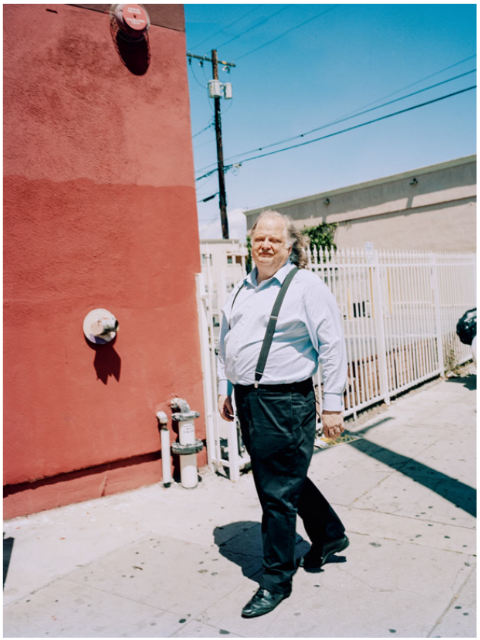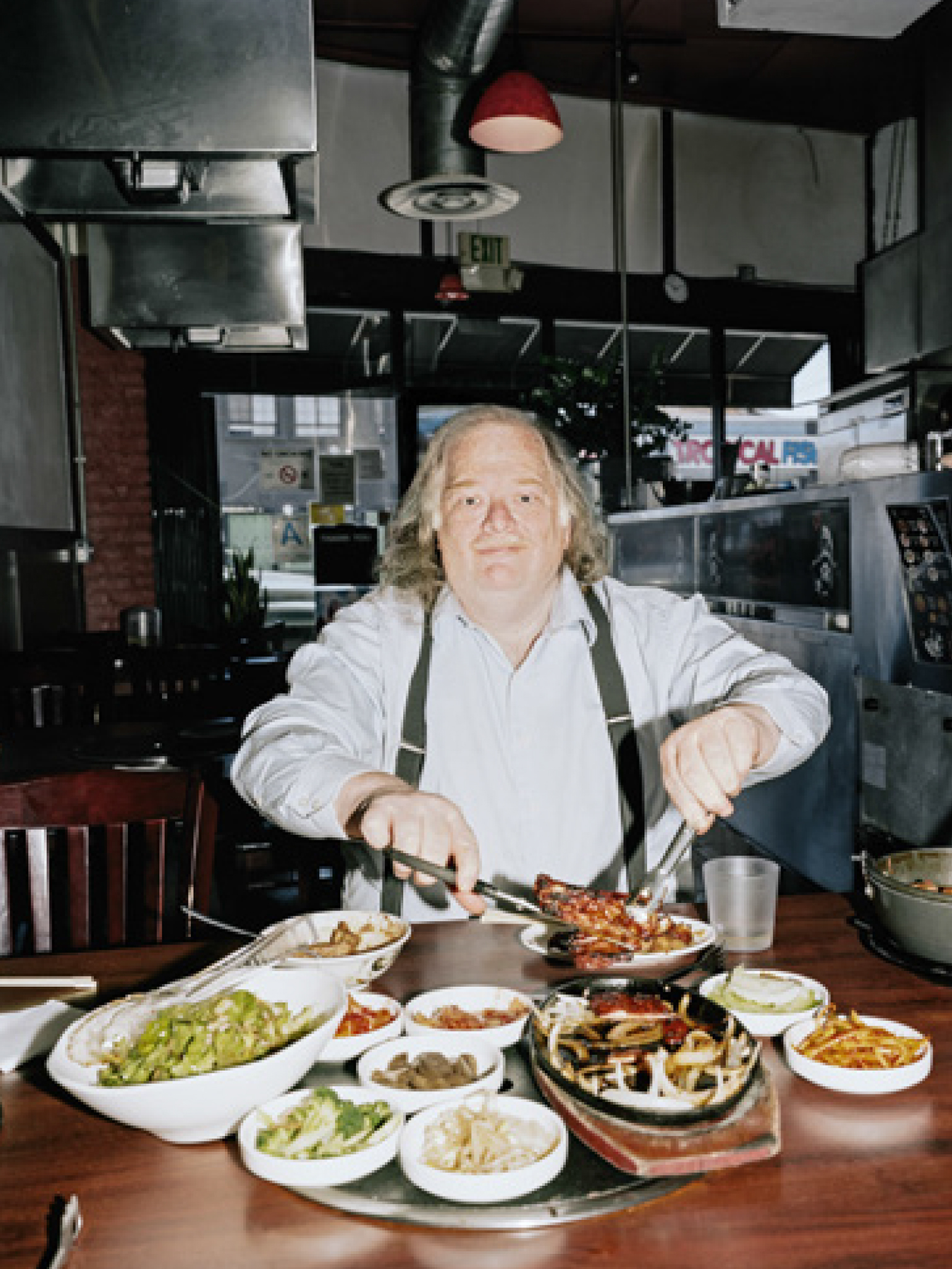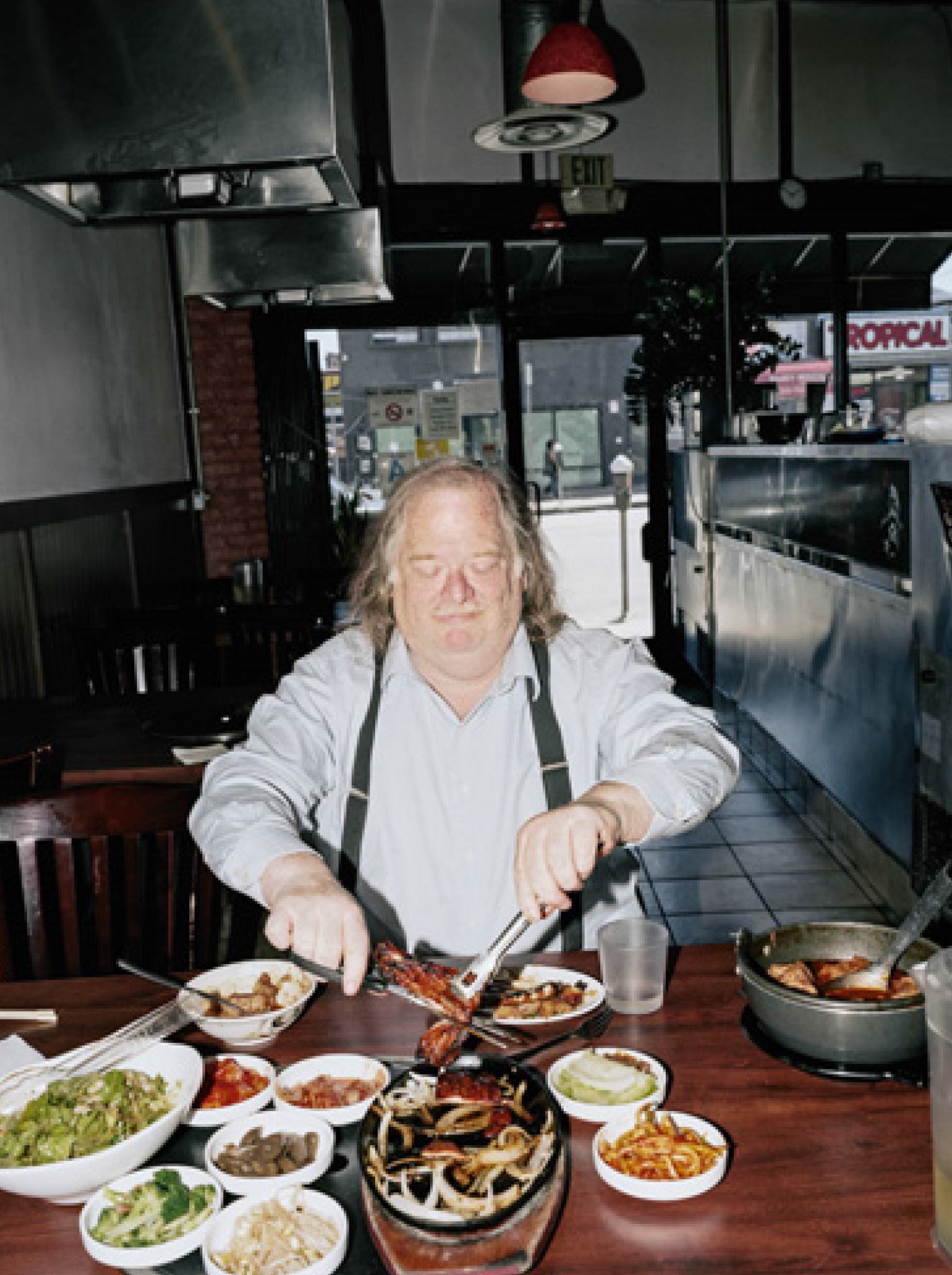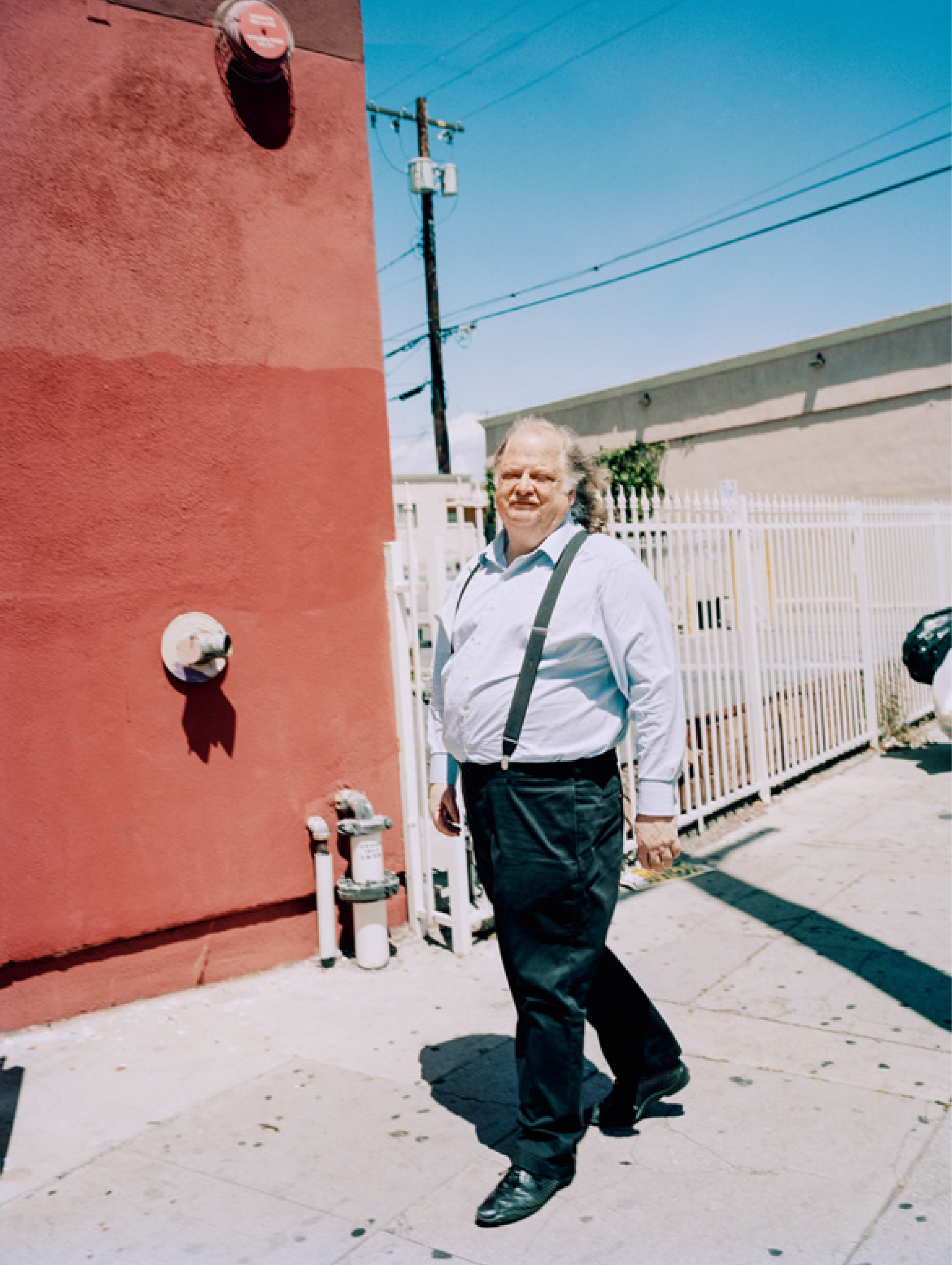



Jonathan Gold,
Los Angeles,
April 15th, 2016
Photography by Mathilde Agius
I was in L.A. between jobs, but on my path of becoming a food writer, when a friend slipped me a relic of an email address: the then food critic of the LA Times, Jonathan Gold. I was uncertain if I would ever get an answer to my out-of-the-blue email, and the fact that I did is one of the things that made Jonathan Gold so special.
We met up at Sapp’s Coffee Shop, a small Thai restaurant in a strip mall, where we shared an unforgettable meal of Jade Noodles tossed with herbs, a Boat Noodle Soup and crab cakes, ending in the sweetest Pandan leaf tea—with cream on top.
When re-listening to the conversation, I had one pressing thought, well aware of how cheesy it may sound: What a happy man he was, so truly in love with what he was doing. Sadly, he is not with us anymore, but his genuine interest and curiosity in food and the people making it was and still is contagious, so is his generosity to share…
You eat out for a living. Is there an ingredient that you are done with?
What everybody jokes of being done with is kale.
Are you done with kale?
Well, I would like to say I am done with kale but I cooked it for dinner last night. It was really good. Tuscan kale, cavolo nero, not the horrible ruffled one.
I hate eggs but I cook them every morning.
Do you cook a lot at home?
Pretty much every day, yeah. I often cook for my kids before I go out – if they are not coming along. I hate eggs but I cook them every morning.
Bad memories?
It is actually the first food memory I have.
Of hating eggs?
It is funny. My first food memory is of me looking at my mother saying: this is the last egg I am ever going to eat.
What made you decide that?
I don’t know, every food writer has one thing they are not going to eat. I just decided I didn’t like eggs. I still don’t really eat them, but eggs are hard to avoid. It’s been a battle in the last two years. Since people discovered sous-vide cooking they’ve put an egg on everything.
How do you cook them at home?
It’s annoying. I not only have to cook them, they all want them in different ways too. My wife likes them fried. I have that one way of doing it, in a pan with olive oil, it gives it a nice crispy exterior but the inside is still gooey. It works really well with duck eggs. My son likes it this annoying way, like scrambled but cooked over really low heat in a double boiler. It takes 15 minutes and you have to constantly stir them. Then you put chives on top in the end. It’s more of a custard almost. And my daughter likes them poached.
I can’t tell you how exciting it was to go out and find not only a new dish but the cooking of an entirely different region.
Did you like to cook when you were growing up?
I was interested in cooking since my twenties. I don’t think I was very good but I was curious. I started going through many cookbooks, I could name authors you wouldn’t even know today… I started with Julia Child, got bored with her, then went on to Paula Wolfert. It was always French food or Italian food. There is no point in learning how to cook Asian food.
Why is that?
Because I live so close to the best Asian cooking in the United States. They are going to do it so much better than I am. Also, I don’t like deep frying. It messes the kitchen up. It’s actually fun to deep fry but it’s not fun to scrub.
You grew up in Los Angeles. How has the city changed over the years?
I grew up in a neighborhood – I would call it south L.A. -, which was racially very mixed. With the ‘Immigration and Naturalization Services Act’ in 1965 things opened up. Until then the only people that allowed to come here were basically people from Europe and not so much from Asia, really not Africa, and really not Latin America. But suddenly, with the new law you had people coming from all over the world. L.A., which has been known as a white city, to the extent that at least in the 20s and 30s one of its nicknames was ‘Iowa by the Sea’, suddenly became a big center of world immigration. Especially people from Latin America and Asia came to L.A..
How did that immigration wave influence L.A.’s food scene?
In different ways. Most of the Chinese families, who came to the US to build the railroads, have been in California specifically since the 19th century. They were almost always from the same area in Southern China which believe me is not an area known for its cuisine. So every Chinese restaurant that opened here had the same fourteen dishes. In the late 70s high cooking started and with more and more people coming to L.A. suddenly the world was out of place. I can’t tell you how exciting it was to go out and find not only a new dish but the cooking of an entirely different region.
L.A. was, and is, as much as anything else, about the freedom to invent yourself and be who you want to be.
Where do you live in L.A. today?
I live in Pasadena, which is about six miles from Downtown.
Is there a neighborhood that is especially exciting in terms of food?
I think it depends. There is something about San Gabriel Valley that is always great. It’s a long valley to the east of downtown that has become pretty solidly Asian. You can drive 20 miles and never be out of sight of a sign in Chinese. There is a neighborhood in Orange County, I guess we call it Little Saigon, that is interesting. After the fall of Saigon in 1975 we started to see a lot of migration, first they lived in sort of settlement camps on the airport space between here and San Diego. When they left they mostly went to a town called Westminster in Orange County because. The Vietnamese food there is so varying.
What does change mean for a city like L.A. where neighborhoods transform so quickly?
It’s hard to know. Los Angeles was the first major city in the country for its minorities to be the majority. When looking at L.A. as a metropolitan region of 80 million people, 12 million of them alone are Mexican or Mexican descent. I think it is the first city in a country where things are becoming – you can call it dystopian if you want. I know people who see L.A. as a version of Blade Runner and this is actually much closer to reality than you think. I don’t mean it in a horrible sense.
You mean here is an openness towards embracing different cultures?
I mean people here do know about Thai food, they do go see Japanese movies and they do listen to Korean pop singers. They do taste taco trucks in East L.A. or know the difference between the music of Northern and Central Mexico. Almost all the couples I know here are one ethnicity paired with another.
Would you say L.A. is a city of integrated cultures?
It’s probably less integrated now than it has been but the next generation – when my kids are my age – I don’t think there will be a difference anymore. You drive around some of the neighborhoods here and see a beautiful Japanese style house sitting next to a Tudor mansion sitting next to a Spanish family style house sitting next to something that could have come out of the Bauhaus and probably did. One of the big cultural flows of Los Angeles was of course the huge number of German intellectuals that fled here during the 1930s.
Oh yes, I visited a few of the Rudolf Schindler houses, the Austrian architect who came to L.A. in the mid-twentieth century and built his most important works here. In this equally broad food scene I was trying to figure out what is typical L.A.. And one phenomenon that seems to be very L.A. is shared eating. When did the dissolving of the set meal began?
There was a place in L.A. called AOC that started it all. It opened around 2000. At that time boundaries exploded here in a way that it doesn’t anymore. You suddenly had a guy doing a taco truck who studied under Ducasse. He has also worked at some of the best restaurants in California, knows the best farmers. He gets his pork from a pig farm that everybody wishes they can get pork from. He is also well connected to the fish market so he gets the best uni and puts it on a tortilla and charges 6 dollars. Instead of putting it on a tasting menu and charging 150 dollars. I think it is starting to happen elsewhere but I think L.A. was, and is, as much as anything else, about the freedom to invent yourself and be who you want to be.
A good meal is cheerful friendship.
You are a professionally trained cellist and reinvented yourself as a food critic – the only one so far who has won the Pulitzer Prize.
My only formal training is as a composer. Back then I did some studio work as a cellist as well as some composing but both not necessarily make one’s living from it. I eventually started to work as a proof reader because that was the actual only skill I had that wasn’t related to music. I started to write classical music reviews for a paper and got to spend time with the composers I worked with. That was good because how else is a 22-year-old able to spend an afternoon with Stockhausen? It doesn’t happen. But I have always been interested in food and one day, that was in the 80s, the guy who owned the paper asked if I wanted to edit the restaurant issue. I figured this way I could take my friends out for free. I turned out to be good at it.
Meals, at least good ones, have rhythm.
Is your love for music reflected in your writing?
I am not sure, I just know that I always mention the music that is playing in the restaurant because so often it has to do with what the place is about. I find that some of the things that I use when writing about music also apply to writing about food. The rules of criticism remain the same: You still are obligated to evaluate things on their own terms. And there is this similar idea of describing abstract physical sensation in words in a way that makes somebody able to feel them, to understand them. It’s almost like a game of translation, from one language into another.
So music and food has something in common for you?
Meals, at least good ones, have rhythm, they have order. It’s a way of structuring time through something that has nothing to do with ordinary time. It’s something that takes a great deal of preparation in order to create a sensation that’s pleasing. And when the music is over the music is over. The same goes for a meal.
What is the most important ingredient for a good meal?
There is not one thing that all good meals have in common but I would say conviviality. A good meal is cheerful friendship. Restaurants can be completely different and serve different purposes and still be great. And as somebody who writes about them every time I go into a new one I still have that feeling of excitement that I imagine theater critics have when they go to a play and see the curtain go up, just hoping that they are going to have one of the best experiences of their life.
Edited for length and clarity